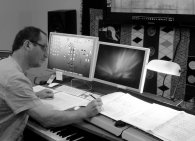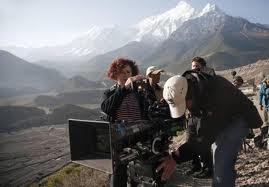 (A Interview with Complete Score to Pascal Gaigne. clic on Read More for a basic English translation)
(A Interview with Complete Score to Pascal Gaigne. clic on Read More for a basic English translation)
El documental 778 La chanson de Roland (El cantar de Roldán), dirigido por Olivier van der Zee, es una coproducción hispano-francesa que investiga los hechos históricos que se relatan en el Cantar de Gesta, a través de cuatro ejes: el relato del guionista y el director tras descubrir en el País Vasco una placa en homenaje a los soldados vascos que derrotaron al Emperador Carlomagno; la recreación histórica de la campaña del ejército de Carlomagno en el año 778 para la toma Zaragoza; las prospecciones arqueológicas en los lugares donde pudo producirse la batalla de Roncesvalles; y los testimonios de expertos en Historia, Arquelogía, Geografía… Hemos hablado con Pascal Gaigne de la música para este documental, que tiene dos versiones: una larga, para las salas de los cines, y una corta de una hora de duración para televisión. Podéis, si queréis, ver esta versión aquí:
- El documental combina tu música con la de Richard Wagner para El anillo de los Nibelungos. ¿En qué fase entraste en el proyecto? ¿Ya estaba decidido que se utilizaría música de Wagner o solo eran temp-tracks?
No, no. Yo estuve en el proceso de este documental desde la primera fase, cuando era solo una idea. Al principio la música de Wagner iba a ser solo una referencia, pero también al principio creíamos que no íbamos a poder tener una orquesta a nuestra disposición. Pero por problemas de derechos no podíamos hacer otra cosa que grabar nuevamente la música de Wagner. Fue todo muy complicado. Entonces, surgió la posibilidad de disponer de una orquesta, la EGO (Joven Orquesta de Euskadi), formada por 85 músicos, todos ellos jóvenes y enormemente entusiastas, que dieron mucha energía. Y fue entonces cuando le sugerí a Olivier van der Zee, el director, que podíamos dejar algunos temas de Wagner en la película y que yo me ocuparía del resto.
- En el documental, tú estás en la narración del presente y Wagner se escucha en las reconstrucciones del pasado. Y sin embargo hay un color bastante homogéneo, es diferente pero no brusco.
 Había que establecer una interacción con el material audiovisual logrado en las entrevistas y que estas resultasen al menos tan amenas como las ficciones hechas con actores. El denominador común que comentas es lo épico. La idea de Olivier era que el documental fuese muy instructivo. Había muchísima información que dar y que gestionar. Él se ha arriesgado mucho, porque no es historiador y lo que plantea el documental no sigue la ortodoxia de la historia que conocemos sobre Roncesvalles, sino que propone una hipótesis diferente. Pero fue un alivio que en un seminario con historiadores de prestigio no se cuestionara su hipótesis.
Había que establecer una interacción con el material audiovisual logrado en las entrevistas y que estas resultasen al menos tan amenas como las ficciones hechas con actores. El denominador común que comentas es lo épico. La idea de Olivier era que el documental fuese muy instructivo. Había muchísima información que dar y que gestionar. Él se ha arriesgado mucho, porque no es historiador y lo que plantea el documental no sigue la ortodoxia de la historia que conocemos sobre Roncesvalles, sino que propone una hipótesis diferente. Pero fue un alivio que en un seminario con historiadores de prestigio no se cuestionara su hipótesis.
- Sin embargo, lo épico en Wagner es serio y grave, mientras tu música, siendo también épica, trasmite una sensación más alegre, no en el sentido ligero sino en el de la felicidad…
Las secuencias ficcionadas explican hechos históricos, y Wagner (aunque sea algo que es anacrónico) da esa solemnidad y seriedad. Pero el documental es también la historia del amor por la Historia, de la pasión de sus investigadores, de la gran recompensa que supone para ellos el descubrimiento de nuevas pruebas. Por ello llevé a su terreno una música feliz, abierta, expansiva, que también contagiara a los espectadores.
- Hay una escena, la más importante (cuando se recrea la batalla de Roncesvalles) donde Wagner desaparece y tú, que siempre has estado en las secuencias del presente, ocupas el espacio. ¿Qué sentido tiene eso?
No lo sé, la verdad es que no fuimos tan racionales. Intuimos que vendría bien a la secuencia.
- Pienso que de alguna manera, al explicar una versión alternativa a la tradición, es una manera de reflejar la alegría o felicidad de los historiadores por haber llegado a esa conclusión tras sus investigaciones, y en cierto modo les regalas a ellos ese momento histórico…
Sí, visto así funciona bien y tiene su lógica. Yo también estoy muy feliz con este trabajo. Más de 30 minutos de música que tuve que hacer en unas tres semanas. Es un tipo de música diferente a lo que me suelen pedir en el cine y la verdad soy como un actor que siempre hace comedia y tiene ganas de explorar otras facetas. Lo hago poco a poco, a medida que me dejan… espero que la gente la disfrute.
© Conrado Xalabarder y MundoBSO, 2012




